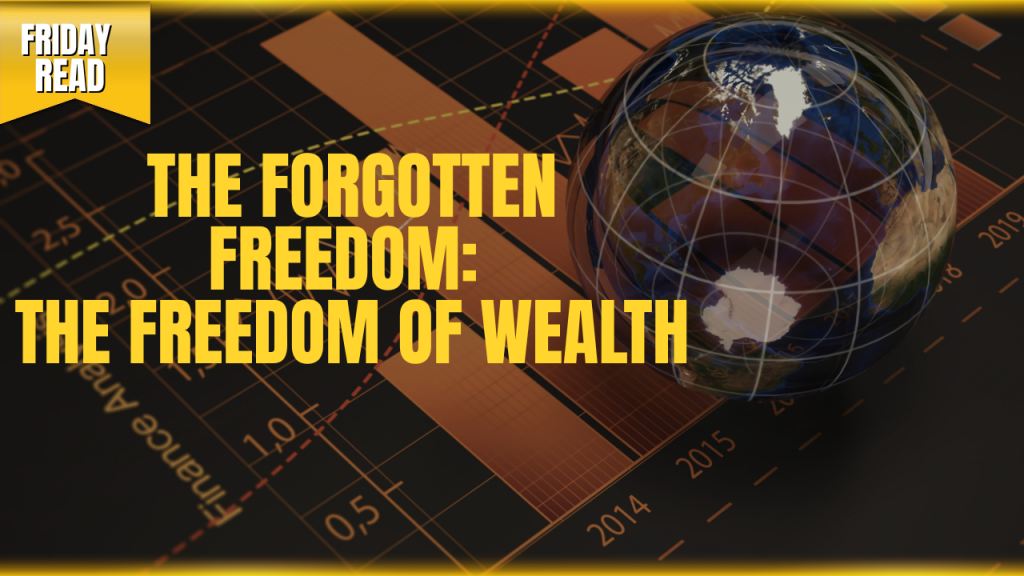
The suspension of Jimmy Kimmel’s late-night show in the United States has set off predictable arguments about censorship and free speech. It must be noted that political pressure and regulatory threats alone were enough to silence one of the country’s most established entertainers.
It is tempting to see this as the most dangerous frontier of liberty. After all, speech is visible. The absence of it is immediately obvious. When a television programme is pulled, or a protestor is arrested, the erosion of freedom is plain to see. The public notices, commentators rush in, and lines are drawn.
Yet the greater loss may not only be in what we can say but also in what we can keep. If speech is attacked at the front of the stage, wealth is slowly expropriated behind the curtain.
Since the abandonment of the gold standard in the early 1970s, control over money has migrated, almost imperceptibly, from the individual to the system. What once represented ownership has been steadily transformed into a claim. A bank balance is not money but a promise by an institution, itself beholden to central bank policy. An investment portfolio is not entirely yours but an entry on a broker’s ledger, subject to suspension or error. With the digitisation of assets this transfer of sovereignty has only accelerated. Few now hold anything tangible. Almost all hold numbers on a screen, revocable at the touch of a key.
Gold vs. Dollar: The Fight of the Century
Unlike free speech, which must be curtailed with the blunt tools of legislation, regulation or public sanction, freedom over wealth can be diminished in ways so subtle as to appear natural. Interest rates are adjusted, quietly transferring purchasing power from saver to borrower. Inflation is permitted to run, steadily eroding the value of savings while protecting debtors, not least governments themselves. Regulatory frameworks multiply, ensuring that access to capital can be granted or denied not by ownership but by compliance. Mission creep has done its work.
What is presented as efficiency is often simply another step away from sovereignty. Digital banking is convenient, but it eliminates the anonymity and autonomy of cash. Central bank digital currencies are marketed as modernisation, but they offer administrators the ability to monitor, restrict or even reverse transactions. Even the once-sacred idea of property rights is undermined when assets can be frozen without trial or confiscated at the stroke of a bureaucrat’s pen.
The mood at Ireland’s National Ploughing Championships this week brought these concerns into sharp focus. Amid the crowds and the machinery, farmers and small business owners spoke less about speeches and television shows than about their savings, their pensions and their land. They asked how they could protect their money from inflation, from taxation, from the arbitrary turns of policy. They worried about what they could really control and what was already slipping beyond their grasp. Their unvarnished and practical questions reflect the same anxiety that Kimmel’s suspension exposes in more theatrical fashion.
Gold offers no solution to the culture wars, but it does provide a form of sovereignty that the financial system increasingly denies. It is not a promise. It is not an entry on a ledger. It does not require permission to hold or to use. It cannot be inflated away or nullified by policy. To own gold is not to speculate on its price but to insist on retaining some measure of control over one’s wealth. In a world where other freedoms are contested openly, it is a quiet but profound assertion of independence.
The lesson is not that speech is unimportant. Quite the opposite. But if the sudden silencing of a television programme provokes outrage, then the decades-long erosion of financial sovereignty should provoke something more. We are not asked to approve it, we are simply led along by it, until money becomes less a form of ownership than a conditional privilege.
Free speech may still generate headlines. Freedom of money has been slipping away for half a century with barely a murmur.
Buy Gold Coins

Buy gold coins and bars and store them in the safest vaults in Switzerland, London or Singapore with GoldCore.
Learn why Switzerland remains a safe-haven jurisdiction for owning precious metals. Access Our Most Popular Guide, the Essential Guide to Storing Gold in Switzerland here.
Receive Our Award Winning Market Updates In Your Inbox – Sign Up Here





